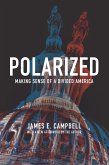There is a widespread belief that American politics is becoming more polarized, in the sense that the Republican Party and electorate are becoming more conservative while the Democratic Party and electorate are becoming more liberal. But is this truly the case? The Phantom of a Polarized America places widely held scholarly assumptions about the "polarization" of American politics under the microscope and tests them to determine their veracity. In the case of Congress, Manabu Saeki reveals that contrary to popular beliefs, polarization is largely due to the rightward shift of Republican legislators without any corresponding leftward shift by Democratic legislators. The conservative shift of House Republican ideology has produced a rightward shift of Republican voters, and conservative voters in the Democratic Party have switched to the Republican Party, resulting in a more liberal Democratic Party overall. Saeki concludes that the so-called "polarization" of American politics is largely a phantom being; in truth, it is a neo-conservative movement led by House Republicans.
Bitte wählen Sie Ihr Anliegen aus.
Rechnungen
Retourenschein anfordern
Bestellstatus
Storno









